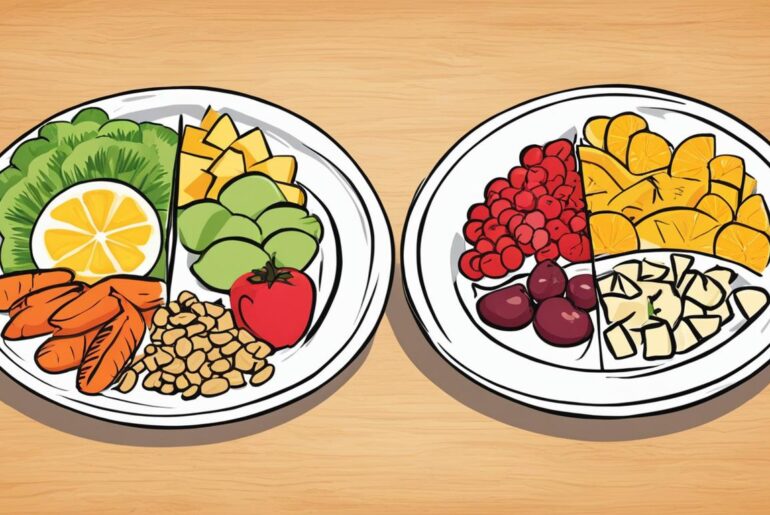When it comes to weight loss, many people wonder how many eggs they should consume in a day. Eggs have gained popularity as a part of various diets, including the egg diet, which is known for its emphasis on protein and low carbohydrate intake. But what is the right amount of eggs for weight loss, and is it healthy to consume eggs regularly?
Let’s explore the topic of eggs for weight loss and healthy egg consumption to gain a better understanding of their role in achieving your weight loss goals.
Key Takeaways:
- Eggs are a good source of protein and essential vitamins and minerals.
- Consuming eggs as part of a balanced diet can support weight loss and overall health.
- The egg diet, while potentially resulting in short-term weight loss, may not be sustainable in the long term.
- A balanced diet that includes a variety of whole foods is essential for sustainable weight management.
- Consult with healthcare professionals or registered dietitians to determine the appropriate daily intake of eggs for your individual needs.
The Benefits of Eating Eggs for Weight Loss
Eggs are a good source of protein and provide important vitamins and minerals. One medium boiled egg contains about 5.5g of protein, which is about 10-12% of an adult’s daily recommended intake. Research has shown that high-protein diets can help with weight loss by promoting feelings of fullness and reducing calorie intake.
In a study, participants who consumed three eggs a day for 12 weeks experienced weight loss and retained lean muscle mass. However, it is important to note that eggs should be consumed in moderation as part of a balanced diet, and following a restrictive egg diet may not be the best approach for long-term weight loss.
Here are the benefits of eating eggs for weight loss:
- High-protein content: Eggs are an excellent source of protein, which can help increase satiety, reduce hunger, and control calorie intake.
- Nutrient-rich: Eggs provide important vitamins and minerals, including vitamin B12, vitamin D, choline, selenium, and iron.
- Lean muscle retention: The protein in eggs can help preserve lean muscle mass during weight loss, which is important for overall body composition.
- Versatile and convenient: Eggs are easy to prepare and can be incorporated into a variety of meals and recipes.
- Affordable: Eggs are a cost-effective source of high-quality protein, making them accessible to many people.
Overall, eating eggs as part of a balanced diet can be beneficial for weight management. However, it’s important to consider individual dietary needs and goals when determining the appropriate daily intake of eggs. As always, it’s recommended to consult with healthcare professionals or registered dietitians for personalized guidance and recommendations.
| Benefits of Eating Eggs for Weight Loss | Egg Diet for Weight Loss | Recommended Egg Consumption for Weight Management |
|---|---|---|
| High-protein content | May be included as a key component in the egg diet | Should be consumed in moderation as part of a balanced diet |
| Nutrient-rich | Can provide important vitamins and minerals during the egg diet | Contributes to overall nutrient intake for weight management |
| Lean muscle retention | Can help preserve lean muscle mass on the egg diet | Supports muscle retention and overall body composition |
| Versatile and convenient | Eggs are easy to incorporate into egg diet recipes | Eggs can be included in a variety of meals and recipes for weight management |
| Affordable | Eggs are a cost-effective source of protein on the egg diet | Provides an accessible and affordable protein source for weight management |
“Eating eggs as part of a balanced diet can be a beneficial strategy for weight loss.”
The Impact of Eggs on Metabolism

Eggs are packed with essential amino acids, making them a valuable addition to support metabolism and weight loss. Their high-protein content plays a significant role in boosting metabolism by increasing the thermic effect of food. The thermic effect refers to the energy required to digest and metabolize the food we consume.
Consuming foods that are rich in protein, such as eggs, can significantly enhance this effect, leading to more calories burned and a greater contribution to weight loss. Incorporating eggs into your diet can provide the required nutrients to fuel your metabolism.
However, it’s important to note that eggs should be consumed as part of a balanced and varied diet that includes other nutrient-rich foods. A well-rounded diet ensures you receive all the necessary vitamins, minerals, and macronutrients for optimal health and weight management.
The Role of Essential Amino Acids in Metabolism
Essential amino acids are those that our bodies cannot produce and must be obtained through our diet. Eggs are considered a complete protein source, as they contain all the essential amino acids required by our bodies.
These amino acids play a crucial role in various metabolic processes, including energy production, tissue repair, and muscle synthesis. When consumed, they support the production of enzymes and hormones responsible for regulating metabolism.
Protein-rich foods like eggs can effectively increase the thermic effect of food and promote weight loss by burning more calories during digestion and metabolism.
The Thermic Effect of Food and Weight Loss
The thermic effect of food accounts for approximately 10% of our daily energy expenditure. Consuming protein-rich foods, such as eggs, can increase this effect even further, resulting in a higher calorie burn (check out my post on protein-rich foods here).
A study published in the Journal of the American College of Nutrition found that a high-protein diet increases energy expenditure and enhances weight loss compared to diets with lower protein content. Participants who consumed eggs regularly experienced greater reductions in body fat and increased metabolic rate compared to those on a lower protein diet.
This suggests that incorporating eggs into your weight loss journey can provide a metabolic boost and support your efforts to shed those extra pounds.
The Importance of a Balanced Diet
While eggs offer numerous benefits for metabolism and weight loss, it’s crucial to remember that they should be part of a well-balanced diet. Including a variety of nutrient-rich foods like fruits, vegetables, whole grains, and lean proteins is essential for overall health and sustained weight management.
By focusing on a balanced approach to nutrition, you provide your body with the necessary fuel and nutrients it needs to maintain a healthy metabolism, support weight loss, and optimize your overall well-being.
| Nutrient | Amount per 100g |
|---|---|
| Protein | 12.6g |
| Fat | 9.5g |
| Carbohydrate | 0.6g |
| Calcium | 56mg |
| Vitamin D | 1.1mcg |
The Role of Eggs in a Healthy Breakfast
Incorporating eggs into a healthy breakfast can be beneficial for weight loss. Studies have shown that eating eggs for breakfast can increase feelings of fullness and reduce calorie intake throughout the day. An egg-based breakfast has also been associated with increased weight loss over time. Pairing eggs with whole grains, vegetables, and fruits can provide a balanced meal that supports weight management. It’s important to note that consuming eggs as part of a healthy breakfast is just one aspect of a comprehensive weight management plan.
Starting your day with a nutritious breakfast sets the tone for healthy eating habits and can have a positive impact on weight management. Including eggs in your morning meal provides a good source of protein, essential vitamins, and minerals, keeping you satisfied and nourished until your next meal.
Research has shown that eggs can help increase feelings of fullness and reduce calorie intake throughout the day. In a study published in the International Journal of Obesity, participants who ate an egg-based breakfast consumed fewer calories during the day compared to those who had a grain-based breakfast.
One possible explanation for this is the high protein content of eggs. Protein is known to promote satiety, or feelings of fullness, by stimulating the release of hormones that help control appetite. By including eggs in your breakfast, you’re providing your body with a nutrient-rich source of protein that can help curb cravings and prevent overeating later in the day.
Eggs can also play a role in long-term weight loss. A study published in the Journal of the American College of Nutrition found that individuals who consumed eggs as part of their breakfast for eight weeks experienced greater weight loss and reductions in body mass index (BMI) compared to those who had a bagel-based breakfast with the same number of calories.
The Benefits of a Balanced Breakfast
- Improved satiety
- Reduced calorie intake
- Enhanced weight loss
- Lower BMI
Pairing eggs with whole grains, vegetables, and fruits can further enhance the nutritional value of your breakfast. Whole grains provide complex carbohydrates, which are a source of sustained energy. Vegetables add fiber, vitamins, and minerals to your meal, while fruits contribute natural sweetness and additional nutrients.
Eating a balanced breakfast that includes eggs, whole grains, vegetables, and fruits can help support weight management by promoting feelings of fullness, reducing calorie intake, and providing essential nutrients.
It’s important to note that while eggs can be a valuable addition to a healthy breakfast, they should be consumed as part of a well-rounded and balanced diet. Incorporating regular physical activity and making overall healthy food choices throughout the day are also crucial for achieving and maintaining a healthy weight.
The Controversy Surrounding Egg Consumption and Cholesterol

When it comes to egg consumption and its impact on cholesterol levels, there has been a longstanding controversy. The concern stems from the fact that eggs contain dietary cholesterol. However, research has shown that consuming eggs does not have a significant effect on blood cholesterol levels for most people.
The current understanding is that the cholesterol in eggs does not necessarily raise blood cholesterol levels as once believed. The body produces its own cholesterol, and when dietary cholesterol is consumed, the body adjusts its production accordingly, maintaining a balance. In fact, for many individuals, the liver compensates by producing less cholesterol when dietary cholesterol intake increases.
It’s important to note that while eggs contain cholesterol, they are also packed with essential nutrients that contribute to overall health and weight loss. Eggs are a great source of protein, vitamins, and minerals that support various body functions and promote satiety, which can aid in weight management.
“Contrary to popular belief, research has shown that consuming dietary cholesterol from eggs does not have a significant impact on blood cholesterol levels for most people. Rather, the overall dietary pattern and the consumption of saturated fats play a more substantial role in cholesterol management.”
When assessing the health implications of egg consumption, it is crucial to consider the overall dietary pattern. Moderation and balance are key. While eggs can be a part of a healthy diet, it’s essential to also focus on consuming other nutrient-rich foods and limiting the intake of saturated fats, as they have a more significant impact on blood cholesterol levels.
Consuming eggs in moderation as part of a balanced diet is generally considered safe and can contribute to weight loss and overall health. The nutritional benefits of eggs, combined with their versatility and affordability, make them an excellent addition to a well-rounded meal plan.
The Role of Saturated Fats
An important factor to consider when evaluating the impact of eggs on cholesterol levels is the consumption of saturated fats. Saturated fats, primarily found in animal products and some plant-based oils, can raise LDL (bad) cholesterol levels when consumed in excess.
It’s worth noting that eggs alone do not significantly contribute to saturated fat intake. For instance, a large egg contains about 1.6 grams of saturated fat, which is relatively low compared to other sources such as fatty cuts of meat or processed foods high in saturated fats.
A well-balanced diet that includes a variety of foods, with a limited intake of saturated fats, can help maintain healthy cholesterol levels and support weight loss goals.
| Saturated Fat Content (per 100g) | Food Source |
|---|---|
| 14g | Butter |
| 5.6g | Beef (70% lean, 30% fat) |
| 5.3g | Pork (shoulder, cooked) |
| 2g | Cheddar Cheese |
| 1.6g | Large Egg |
As shown in the table, eggs have a relatively low saturated fat content compared to other common sources. By keeping an eye on total saturated fat intake and incorporating eggs into a well-balanced diet, you can enjoy their nutritional benefits without compromising cholesterol management or weight loss efforts.
To summarize, while there has been controversy surrounding egg consumption and cholesterol, research suggests that eggs can be part of a healthy diet that promotes weight loss and overall well-being. By considering the overall dietary pattern and limiting saturated fat intake, consuming eggs in moderation can be a nutritious choice.
The Importance of a Balanced Diet for Weight Loss
While eggs can be a nutritious addition to a weight loss diet, it’s important to remember that a balanced diet is key to sustainable weight loss. Restrictive diets, such as the egg diet, may provide short-term weight loss results but may not be sustainable in the long term. A balanced diet that includes a variety of whole foods, such as fruits, vegetables, lean proteins, and whole grains, is the best approach for long-term weight management. Making sustainable changes to eating habits, reducing processed foods, and incorporating physical activity are important factors in achieving and maintaining a healthy weight.
The Role of Eggs in a Healthy Lifestyle

Eggs can be a valuable component of a healthy lifestyle when consumed in moderation. They offer a range of essential nutrients, including protein, vitamins, and minerals, that support overall health and weight management.
Protein is an essential macronutrient that plays a crucial role in weight loss and maintenance. Eggs are an excellent source of high-quality protein, containing all the essential amino acids your body needs. Including eggs in your diet can help increase satiety, reduce calorie consumption, and support lean muscle mass.
Furthermore, eggs provide vital vitamins and minerals that contribute to overall health. They’re particularly rich in vitamin B12, vitamin D, selenium, and choline. These nutrients have various roles in the body, including supporting brain function, maintaining healthy bones, and aiding in metabolism.
When incorporating eggs into your diet, it’s important to consider your individual dietary needs and goals. If you’re following a weight loss plan, the daily egg intake will depend on various factors, such as your calorie requirements, activity level, and overall diet composition. Consulting with a healthcare professional or registered dietitian can provide personalized guidance on how to integrate eggs into your weight loss plan effectively.
To better understand the benefits of eggs, let’s explore some key nutrients they provide:
| Nutrient | Amount per 100g |
|---|---|
| Protein | 13g |
| Vitamin B12 | 1.1mcg |
| Vitamin D | 87.7IU |
| Selenium | 20.4mcg |
| Choline | 294mg |
It’s worth noting that while eggs offer many nutritional benefits, it’s crucial to consume them as part of a balanced diet. Incorporating a variety of nutrient-rich foods, including fruits, vegetables, whole grains, and lean proteins, is essential for overall health and sustainable weight management.
Expert Insight
“Eggs can be a nutritious and convenient choice for individuals looking to manage their weight. They provide a satiating source of protein, along with essential vitamins and minerals. However, it’s essential to consider individual dietary needs and goals when determining the appropriate daily egg intake.” – Dr. Sarah Johnson, Registered Dietitian
In summary, incorporating eggs into a balanced diet can be a valuable step towards a healthy lifestyle, supporting weight management and overall well-being. They offer critical nutrients, such as protein, vitamins, and minerals, and can contribute to a feeling of fullness. However, it is important to consider individual needs and goals and consult with a healthcare professional or registered dietitian for tailored recommendations.
The Potential Health Risks of Excessive Egg Consumption

While eggs can be a nutritious part of a healthy diet, it’s important to be mindful of excessive consumption. Eating high quantities of eggs may lead to increased cholesterol levels and potentially contribute to cardiovascular disease in some individuals.
It’s important to balance egg consumption with a variety of other nutrient-rich foods and consider individual dietary needs and health conditions.
“Consuming a variety of foods is essential for overall health and well-being. While eggs offer numerous nutritional benefits, it’s important to remember that moderation is key. Excessive consumption of eggs can contribute to elevated cholesterol levels, which may increase the risk of cardiovascular disease.”
– Dr. Elizabeth Sullivan, Registered Dietitian
Managing Egg Consumption:
- Incorporate other sources of lean protein such as poultry, fish, legumes, and tofu into your diet.
- Include a variety of fruits and vegetables to ensure a balanced nutrient intake.
- Limit the consumption of processed foods high in saturated fat and cholesterol.
- Consult with a healthcare professional or registered dietitian to assess individual dietary needs and create a personalized nutrition plan.
Understanding Cholesterol:
Dietary cholesterol is found in animal-based foods, including eggs. While some individuals may be more sensitive to the effects of dietary cholesterol, for most people, consuming eggs in moderation does not significantly impact blood cholesterol levels. However, it’s important to consider other sources of saturated fat in the diet, as they can have a greater impact on cholesterol levels.
Comparison of Cholesterol Content in Foods
| Food | Cholesterol Content per 100g |
|---|---|
| Eggs | 372mg |
| Beef (85% lean) | 80mg |
| Chicken Breast (skinless) | 84mg |
| Salmon (cooked) | 63mg |
Does Eating a High-Protein Diet Help with Weight Loss, Including consuming eggs daily?
Eating a high-protein diet can support weight loss goals. Research suggests that protein intake for weight loss can boost metabolism and reduce appetite, leading to fewer calories consumed. Including eggs in your daily diet can provide a good source of protein, helping you feel full and satisfied while promoting healthy weight management.
Conclusion
In conclusion, incorporating eggs into a balanced diet can be a healthy and nutritious approach to weight loss. Eggs provide a good source of protein, essential vitamins, and minerals that support overall health. While the egg diet may offer short-term weight loss benefits, it is important to consider the long-term sustainability and overall dietary pattern when aiming for a healthy weight.
Achieving and maintaining a healthy weight is best accomplished through a balanced diet that includes a variety of whole foods, such as fruits, vegetables, lean proteins, and whole grains. Physical activity is also an essential component of a healthy lifestyle. Consulting with healthcare professionals or registered dietitians can provide personalized guidance and recommendations tailored to individual needs and goals.
When it comes to eggs and weight loss, moderation is key. Enjoying eggs as part of a well-rounded diet allows for the benefits they offer while minimizing the potential risks associated with excessive egg consumption. Remember, a sustainable and balanced approach to eating and lifestyle choices is integral to long-term weight management and overall health.
FAQ
How many eggs a day is healthy for weight loss?
There is no one-size-fits-all answer to this question as it depends on various factors such as your overall diet, activity level, and individual health goals. However, in general, incorporating eggs into a balanced diet can be beneficial for weight loss. It is recommended to consume eggs in moderation, typically up to seven eggs per week, as part of a varied and nutrient-rich meal plan.
What are the benefits of eating eggs for weight loss?
Eggs are an excellent source of protein, which can help increase feelings of fullness and reduce calorie intake throughout the day. Additionally, they provide important vitamins and minerals that support overall health. Incorporating eggs into a weight loss diet can contribute to a balanced meal plan and promote weight management.
How do eggs impact metabolism and weight loss?
Eggs contain a good balance of essential amino acids that can support metabolism. Consuming high-protein foods like eggs can boost metabolism by increasing the thermic effect of food, which can help burn more calories and contribute to weight loss.
What is the role of eggs in a healthy breakfast for weight management?
Studies have shown that eating eggs for breakfast can increase feelings of fullness and reduce calorie intake throughout the day. Incorporating eggs into a healthy breakfast, along with whole grains, vegetables, and fruits, can provide a balanced meal that supports weight management.
Is there a controversy surrounding egg consumption and cholesterol for weight loss?
While eggs do contain dietary cholesterol, research has shown that dietary cholesterol does not have a significant impact on blood cholesterol levels for most people. It’s important to consider the overall dietary pattern and the consumption of other sources of saturated fat when assessing the health implications of egg consumption. Consuming eggs in moderation as part of a balanced diet is generally considered safe and can contribute to weight loss and overall health.
How important is a balanced diet for sustainable weight loss?
A balanced diet that includes a variety of whole foods is key to sustainable weight loss. Following a restrictive diet, such as the egg diet, may provide short-term weight loss results but may not be sustainable in the long term. Incorporating a balanced and varied meal plan, reducing processed foods, and incorporating physical activity are important factors in achieving and maintaining a healthy weight.
How can eggs be part of a healthy lifestyle for weight management?
Eggs can be a nutritious addition to a balanced diet, providing protein, vitamins, and minerals. Incorporating eggs into a healthy meal plan can support weight management and overall health. It’s essential to consider individual dietary needs and goals when determining the appropriate daily intake of eggs.
What are the potential health risks of excessive egg consumption?
While eggs can be a part of a healthy diet, excessive consumption may increase the risk of certain health conditions. Eating high quantities of eggs may lead to increased cholesterol levels and potentially contribute to cardiovascular disease in some individuals. It’s important to balance egg consumption with a variety of other nutrient-rich foods and consider individual dietary needs and health conditions.
Are eggs a healthy option for weight loss?
Eggs can be a healthy and nutritious addition to a balanced diet, particularly for weight loss. They provide protein, important vitamins, and minerals. While the egg diet may result in short-term weight loss, it is important to consider the long-term sustainability and overall dietary pattern. A balanced diet that includes a variety of whole foods and incorporates physical activity is the most effective approach to achieving and maintaining a healthy weight.
Source Links
- https://www.healthline.com/nutrition/eggs-weight-loss-food
- https://www.livestrong.com/article/287830-how-many-eggs-can-you-eat-per-day-on-an-egg-diet/
- https://www.medicalnewstoday.com/articles/320118




